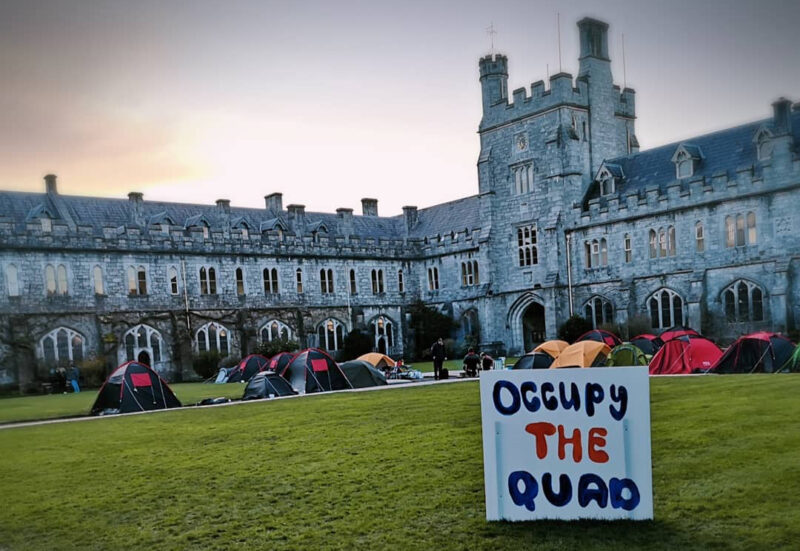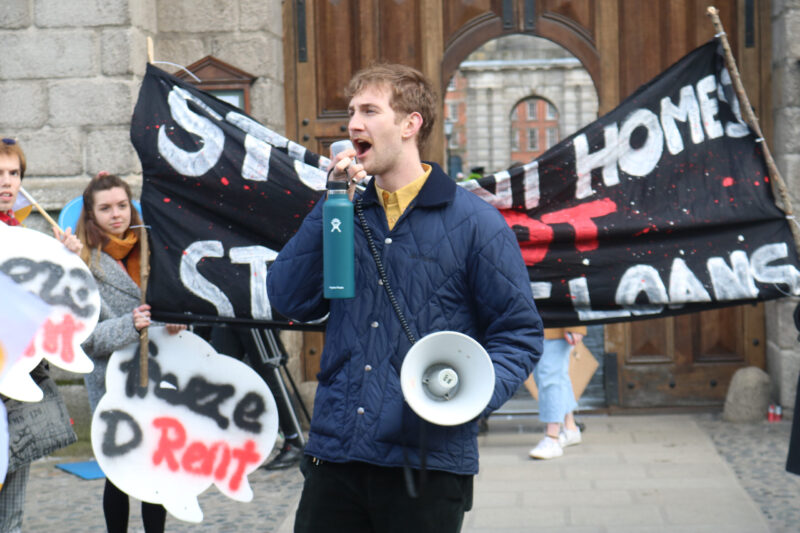At the beginning of the year, when the results of the general election began filtering in, the nation was in a state of shock. Back before we realised that the coronavirus was about to change the way we live our lives, at least for a period of time, many thought the event that would rock Irish society could be the formation of a left-wing government.
Sinn Féin’s victory in the polling stations had political commentators both at home and abroad at a loss – how had a party with such significant historical baggage managed to convince voters of every age to look not back at the tragic past, but forward, to a different kind of future?
A few weeks later, the answer had started to become clear. Universities around the country announced that they were increasing on-campus rents by between three and four per cent – the maximum amount allowed by rent pressure-zone legislation – and students were reacting with outrage. University College Cork Students’ Union (UCCSU) had students occupying campus, and vowing not to leave until the rent hikes were scrapped. University College Dublin Students’ Union (UCDSU) attempted to storm the campus restaurant, calling on UCD President Andrew Deeks to take note of their “people power” from his “ivory tower”. Even here in Trinity, where the once-promising Cut the Rent group had to cancel its campaign due to lack of student support, protestors formed a human chain and blocked off access to Front Arch. The demonstration was covered by national media outlets.
Provost Patrick Prendergast beseeched students to understand that accommodation “cannot be cross-subsidised by revenues from student fees or research grants”, while Deeks called student reaction to the increases “emotional”. Neither, it seems, understood that for students, this was about much more than rent.
It’d be unfair to say that this is just a couple of people in their ivory towers making these decisions blindly. They have a choice. They’re just making the wrong one
“There is a level of greed here – a level of hypocrisy and selfishness”, Craig McHugh, the Union of Students in Ireland’s (USI) vice-president for the Dublin region, tells The University Times. “It’d be unfair to say that this is just a couple of people in their ivory towers making these decisions blindly. They have a choice. They’re just making the wrong one.” However, the protests that erupted across campuses suggested that there were a number of wrong choices made in the lead-up to this decision.
For Katie Deegan, the president of Maynooth Students’ Union (MSU), part of the problem was the way in which the rent hike was introduced. She tells The University Times that she had “only heard about it just through the grapevine”: “That decision was taken without student consultation.”
Clare Austick, the president of NUI Galway Students’ Union (NUIGSU) tells The University Times that despite the union going through an extensive consultation process with the university about how to keep the cost of living down for students, the college “promised something, and went back on their word at the first opportunity”.
Every university proposing higher rents, apart from NUI Maynooth, are raising their costs by the maximum amount allowed by legislation, exacerbating the considerable anger and frustration that student leaders are feeling as it is.
The cap, Austick says, “is not supposed to be seen as a target, but rather a limit”. Of the decision to increase rent by four per cent, McHugh said: “I think people perceive this as, ‘hang on a second, you’re basically saying you’d push it up to 10 per cent if you could’.”
The situation is arguably the worst in University College Dublin (UCD), where accommodation costs are already astronomical, and are set to be raised by 12 per cent over the next three years. But, speaking to The University Times, Joanna Siewierska, President of UCDSU makes it clear that it was the principle behind the decision, not the percentage, that was infuriating. “You know what, even if it went up by just four per cent for one year, I’d be feckin’ rallying. But three years? It’s the feckin’ cherry on top!”
Student leaders are very familiar with the higher-education funding crisis, and agree that the accommodation shortage is a side-effect of the desperately underfunded sector. Austick says that “universities are scraping by as it is – this is their way of trying to bring income into the institution”, while Deegan acknowledged that colleges are “doing wrongs to right the wrong”.

In February, UCC students began occupying the college in protest against rent increases.
But if universities are continuing down this path of placing an increasingly heavy financial burden on students wishing to move away from home to attend college, what are the repercussions going to be? And for how long is this pattern sustainable?
Siewierska tells The University Times that UCDSU have had “a number of red flag student cases coming to our attention, and my goodness, the stories are incredibly worrying”.
“We see students in the most vulnerable situations”, says Austick. “We call them the hidden homeless – who couch surf, people living in hostels and B&Bs. People have become complacent and this has been normalised.”
Meanwhile, despite the rising costs, the quality of on-campus accommodation is failing to match the luxury price-tags attached to it. In NUI Maynooth, the residential assistants who used to monitor the on-campus accommodation have been replaced by staff from a private security company, and students can no longer even get parcels delivered to their apartments. Deegan said: “That’s outrageous – you pay rent there! If you’re going to increase the rent, you very much better be increasing the quality of services you’re getting for your students. Right now, the quality of services … is shocking.”
According to McHugh, this shifting focus away from students and on to the bottom line, has been creeping in to universities for years: “In the past, it would’ve been precarious working contracts, low wages for staff, the increase in the student contribution charge.” This has all been as a result of the “privatisation of higher education”, McHugh says, and for students, much like the general population, the time has come to say enough is enough.
“In the last year the housing crisis has opened up to a lot more people than it would’ve been in the past. It’s affecting everyone and it’s really pushing people to the brink. I think we saw that in certain election results – people are just not happy.”
Siewierska agreed that the general election has played a part in motivating people to mobilise against the rent increases, bucking a trend in recent years of universities increasing rent without pushback from students: “This was the election of health and housing. One thing is clear, people are upset at the lack of progress in solving the housing crisis. What students are struggling with is quite similar to the general population.”
You know what, even if it went up by just four per cent for one year, I’d be feckin’ rallying. But three years? It’s the feckin’ cherry on top!
Austick echoes this, saying: “Now we’re at the point where something really needs to happen. Things just cannot go on the way they are, because it’s worsened and it’s at breaking point.”
This general appetite for change has not gone unnoticed by university heads. In an interview with The University Times, Deeks says: “I think there is an increase in protest movements more generally in society this year that has resulted in this year being a particular one for activism. This has acted, I think, as a catalyst for the expression of things that a particular group of the student population are not happy with.”
However, from his perspective, the decision to increase the cost of on-campus rent was a simple matter of supply and demand: “We have three times as many applicants for on-campus accommodation as we can supply accommodation to, so we see that the way to relieve the squeeze on the student accommodation market which is leading to such outrageous prices being charged for just basic digs, is to put more accommodation on the market.”
The rent hikes, then, are being introduced to fund the construction of more desperately needed bed spaces. These bed spaces, though, are set to come with a price tag of between €8,000 and €9,900 per academic year. Will there be a demand for such extortionately priced accommodation? Deeks is confident that there will be.
“The argument that they aren’t affordable”, he says, “isn’t backed up by the fact that we have three applicants for every space we have available. If they were not affordable, then our applications would be going down rather than up.”
The UCD president points to the college’s application data to engage in a myth-busting exercise in our interview: “The vast majority of people we have rejected application from are actually Irish. This is not about somehow the international students can afford it, and the national students can’t.”
“They [UCDSU] argue that the increase in accommodation is resulting in more people not being able to complete their studies at university, yet our statistics for completion show that our completion rates are holding up and in fact, increasing. They make the argument that this works against widening participation, yet we now have 32 per cent of our students coming from widening participation backgrounds, our highest ever.”
The statistics are certainly compelling. So is the argument that student accommodation should not be subsidised by general university funds, as this would result in only the small group of students benefiting from a rent freeze, while their classmates in the private rental market are awarded no such luxury. However, statistics alone do not paint an accurate picture of the huge toll the housing crisis is having on students and their families.
Firstly, the fact that there are more students than in the system is bound to see a spike in figures across the board. But while students may continue to apply for on-campus accommodation, that does not necessarily mean they can easily afford it. Applications are more likely to be soaring because of the well-documented vulnerability that comes with renting from private landlords, than because students can afford to pay almost €10,000 for basic accommodation.

At a protest last weekend, TCDSU President Laura Beston criticised on-campus rent increases.
Living on campus may involve families taking out loans to cover the cost of accommodation, or students working every hour they can in order to foot the bill. Student leaders are on the frontlines of dealing with the fallout from situations like this. Perhaps that is why they are reacting “emotionally” to these increases.
On paper, more students from minority groups might be coming to college than ever before, but Siewierska pointed out the flaw in these figures: “Every year, we do have a bigger access cohort on campus, but when you break it down, we’re doing really well at getting students with disabilities registered with the service but we’re not really increasing numbers of students from lower socioeconomic backgrounds.”
Deeks suggested that the cost of accommodation in the private market would drop if UCD was able to house more students on campus. But equally likely is the scenario where landlords will match the sky-high on-campus prices, safe in the knowledge that students are desperate and willing to fork our huge sums for a roof over their heads.
It is difficult to avoid the conclusion that the student accommodation crisis is stemming from the chronic lack of funding in the higher-education sector. Universities have a duty to provide affordable accommodation to their students – they should not be tasked with responding to the national housing shortage and placing the inflated costs of construction on to students. But, until a decision is made on how to fund the sector, that is exactly what they will continue to do.
It’s hard to see how the situation will develop from here – student leaders are promising not to back down on the issue, while Deeks said, “from my perspective, from the Provost’s perspective, this is something where there is no room for negotiation”.
The general population voiced their frustration when they casted their votes in February, and students around the country are voicing their frustrations now. How it will all end up, only time will tell.







